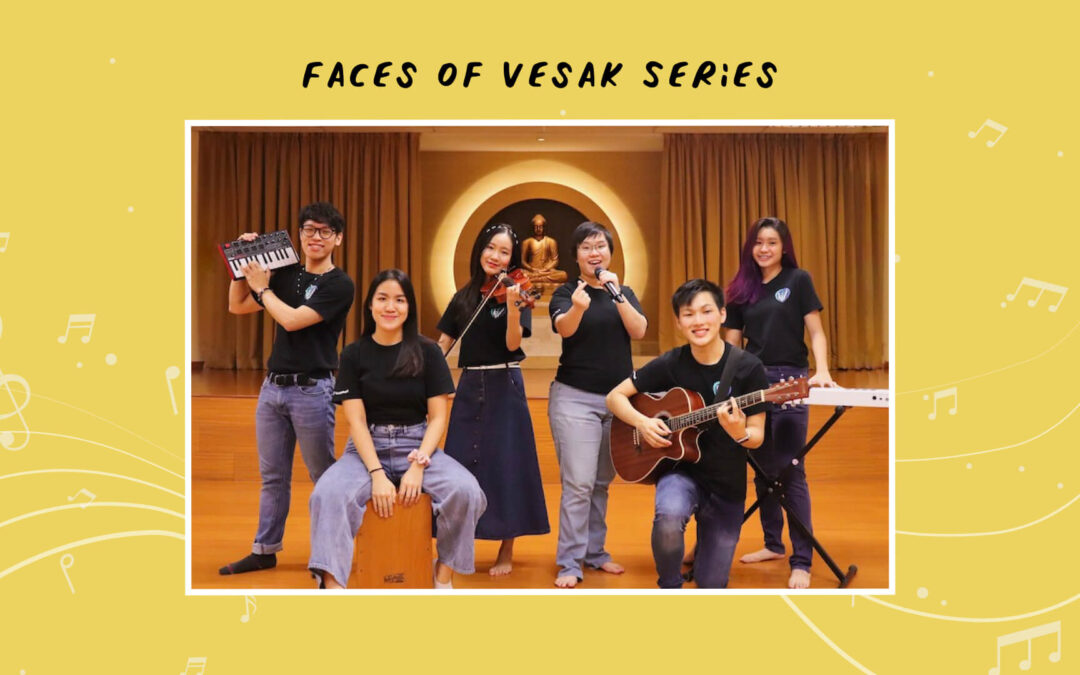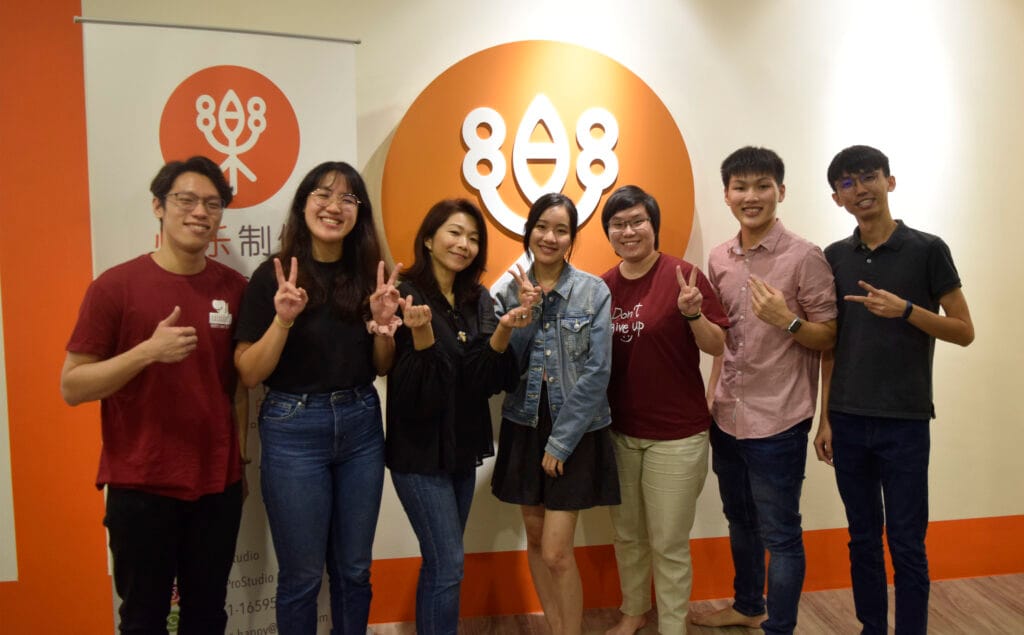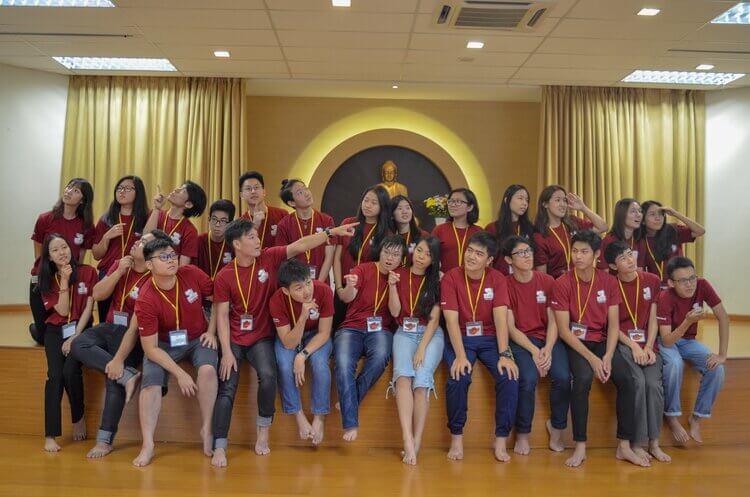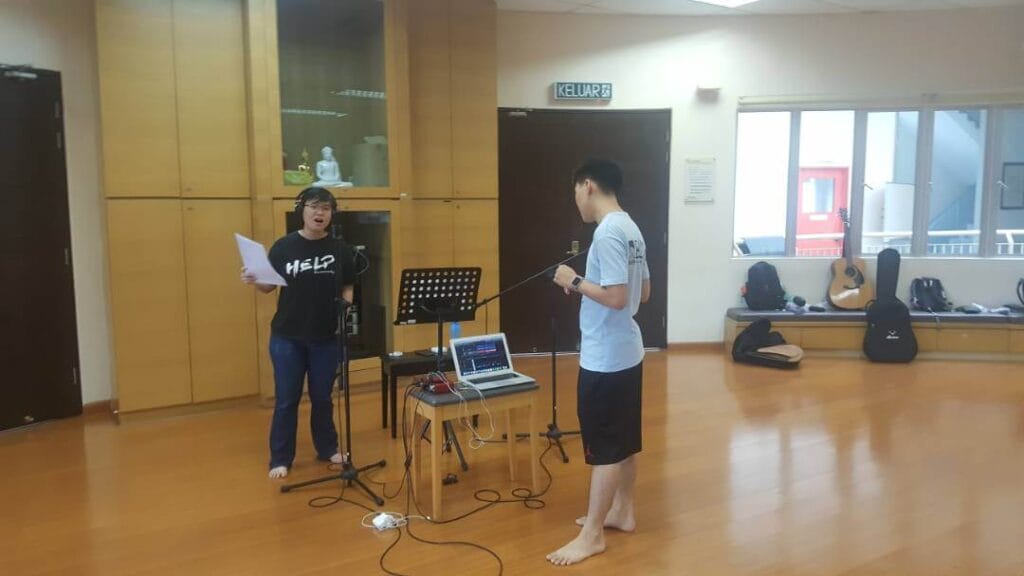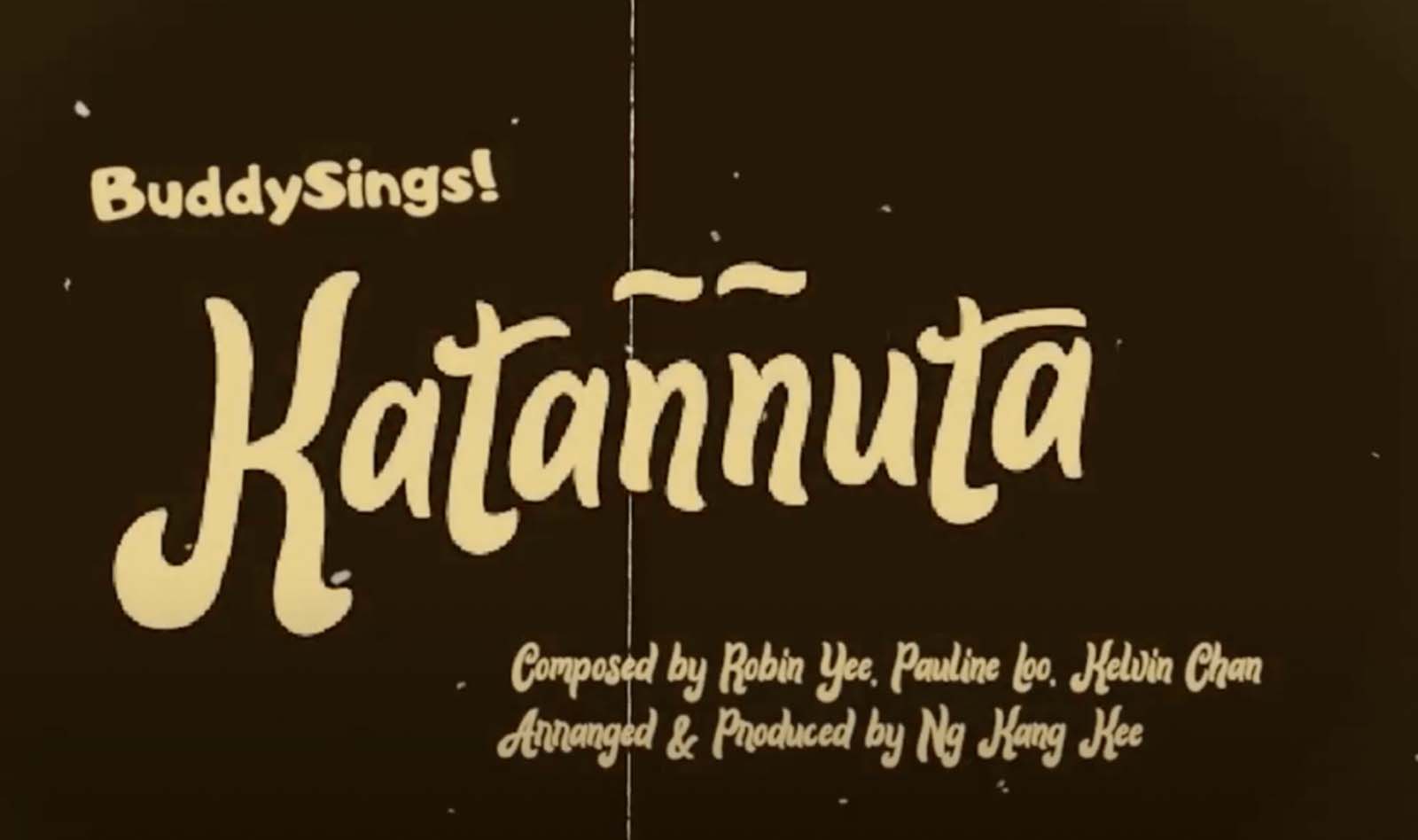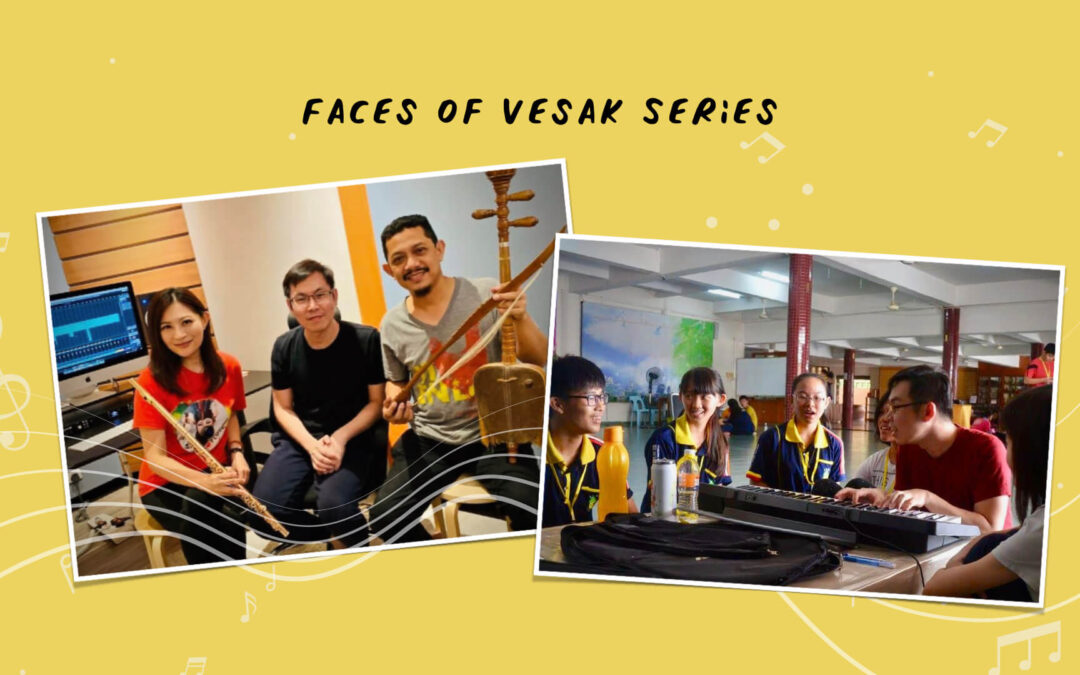
PhD graduate & ex-research scientist turned full-time music producer (Ft. Dr Kang Kee)
As part of the Faces Of Vesak series, we met with Dr Kang Kee who left his job as a research scientist in order to create a social impact to the community. We learned about what inspires him to keep going on after more than 10 years, and how Buddhist music has helped make a difference in people’s lives.
The contents of this article are extracted from a podcast interview with Bro Kang Kee. Listen to the full episode here:
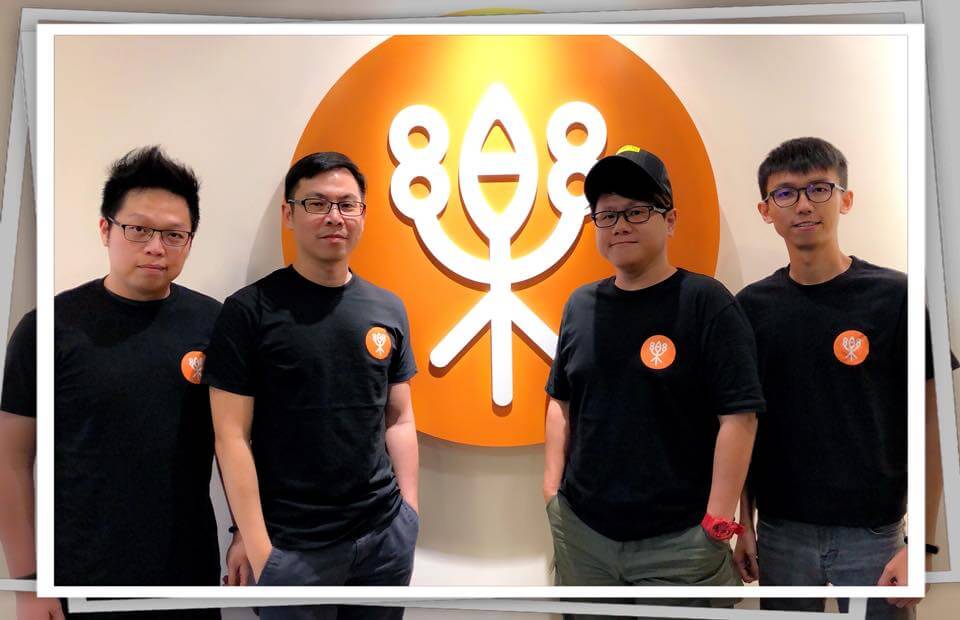
Q: Tell us more about yourself and how you got started.
I grew up in Malaysia. When I was in secondary school, I joined Buddhist groups, and also a Buddhist society in school. At the same time, that’s where I learned guitar and songwriting. And because of that, I have a lot of opportunity to share my compositions with my fellow Buddhist friends in the circle. And eventually I was spotted by some teachers. And they brought me to a bigger platform where I could share all my songs and so on. That’s where I started to build my passion in music.
And this is a good platform because at the same time, I learned that music is a very effective tools to bring positive message to people. After that, I graduated as an engineer, I came back from the states. I studied in a U.S university, graduated from there, then I came back, I worked as engineers for a few years before I became a full-time music producer for eight months in Malaysia.
But it didn’t work out because I think it’s very hard to survive as a full-time music producer. So after eight months, I went back to being an engineer. That’s when I travelled to Singapore. And subsequently, I have been here in Singapore as an engineer and as a research scientist for about maybe 17 years. After which, I became a full time music producer again because mainly because of the passions that I have in music, and also the belief that music can be a very good tool to bring positive message to people.
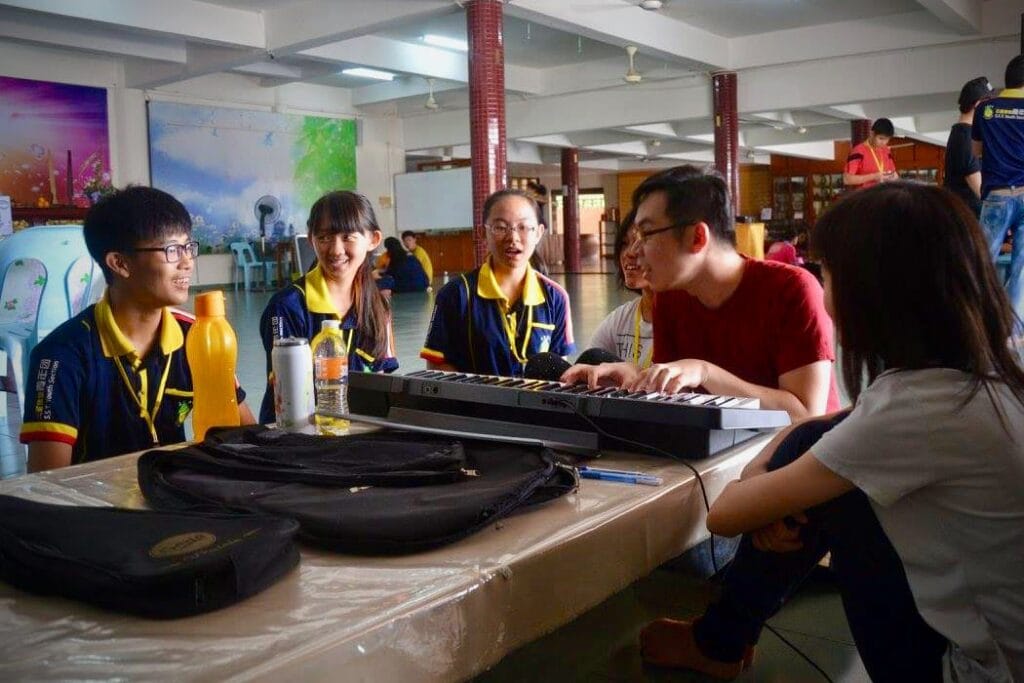
Q: From being a research scientist to a musician, and to be doing it full time. That’s quite a big transition. Considering that it is quite tough to make a living in the music industry, what motivated you to take that leap to come back to pursue music again? After 17 years, what changed?
Nothing changed that is why I came back again – My mentality and the passions in music didn’t change. But of course, this time, I am definitely more mature. There were a lot more considerations to make, but this is more of a personal decision made at the right time.
Given the conditions at the time when I made this decision (to be a full-time music producer), the conditions and the decisions that I have made were an accumulation of the effort I’ve put in for the past 20 years.
In the past, on top of my full-time career, I would continuously spend my free time to acquire music production knowledge and to work on a lot of different activities and projects for the Buddhist community to continue to do music, to find interest, to work with different people in the music production ecosystem.
All those things lead to the eventual formation of Happy Productions today. Hence, it wasn’t a sudden decision. Rather, it took continuous effort, and when the conditions were right, when the conditions matured, then I made this decision and transit over to become a full-time musician.
Of course, when I planted these seeds 20 years ago, I never had a firm decision that one one day, I would become a full-time music producer. It was an accumulation of conditions led to this decision. I just followed the flow and gave it a try.
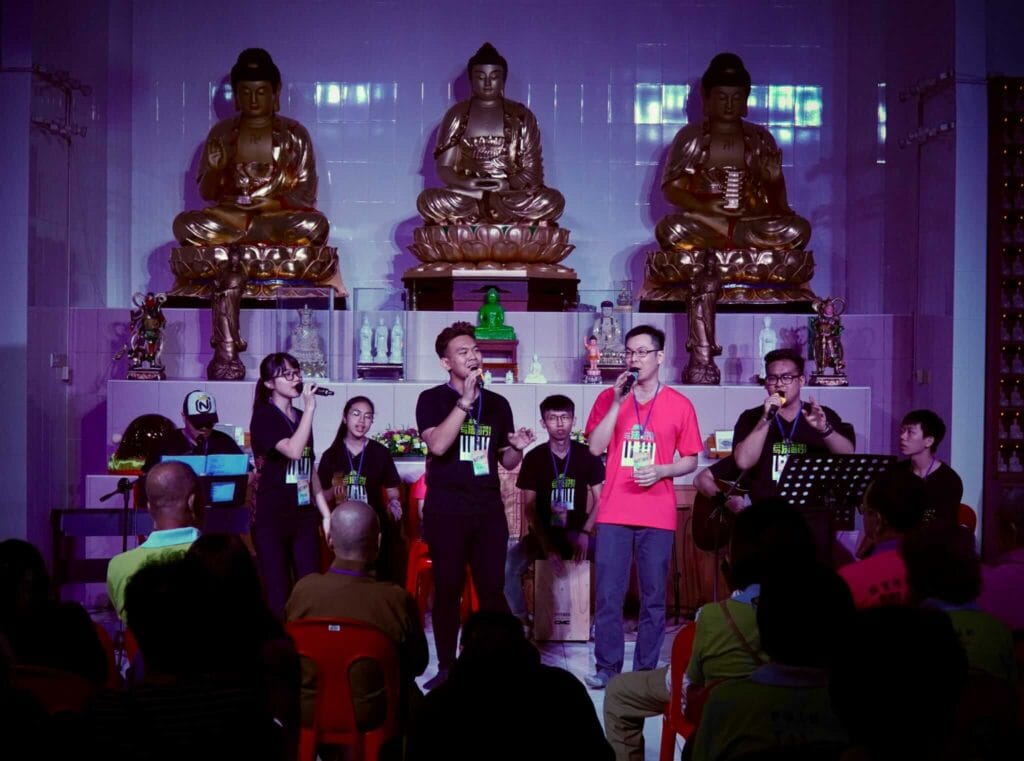
Q: Tell us more about why you chose music as a tool to create impact. You could have shared the Dhamma or build a community through other different means such as writing, podcasts, and different formats. Why music?
This is definitely because of my passion and my background. As I mentioned, I started learning music in the Buddhist environment, so I have become attached (to this way of creating impact).
There were a few moments from the past that left a deep impression in my mind. For example, when we graduated, our teachers gave us a space to share our songs with a thousand audiences. The moment when people clapped along with the song, it showed that they were in the moment, and that they were touched by the message of the song. Such a moment etched in my mind and that gave rise to the idea of that I wish to continue to do this.
I also followed the footsteps of the teachers that I’ve learned from. I have a lot of good teachers as I was growing up. They’re all laypeople. Despite their full-time jobs, they sacrificed their free time for us. When we were teenagers, sometimes they had to follow us to disco until midnight. After midnight, they would make tea and drink the tea with us, and talk to us about our problems. I wish that I can do the same for the current youths. I’m motivated to continue to use music as a tool because it is the most effective tool that I have learned so far.
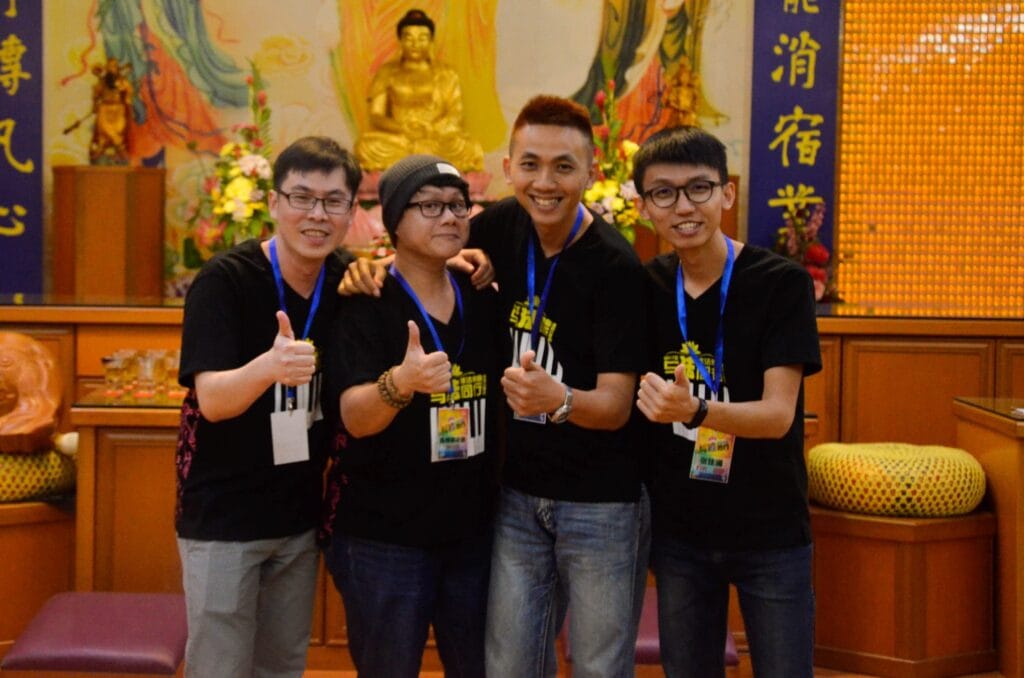
Q: Out of all of the songs that you have produced or have written, is there any one that is very close to heart, or any one that has a special meaning to you?
Every song that I composed definitely has some meaning to me. But as a creative in the creative line, there is a constant doubt whether the songs I wrote are the best I could have written, or whether the melodies are the best, or whether the audio mixing is the best that I could get and so on. But usually those moments are created because of their responses to the songs that I wrote. The important moment for me is when these songs are shared with people and the songs become a part of them.
There is one recent example. I have a very good friend, a very young friend who just passed away a few days ago. For the past five to six years, we organised compositions camps with the youth group in Sarawak, Malaysia. And there was this really talented young boy. He got straight A’s for SPM, which is the equivalent of the O level in Singapore. It was his first semester in the University of Malaysia when he passed away. He collapsed during his sports exercise and passed away.
He joined our composition camp and wrote a song with the team. That song is about home. Because he traveled, he wrote the song for his family. During his funeral, the group of youths sang the song together.
That was a very important moment for me. Although the song was not written by me, but I’m part of the seed that created all these things and eventually become a very important moment for the Buddhist youth group, and also hopefully for him.
There is also a friend that I met in an organisation who approached me when she came to know that I wrote a song called 生命中的朋友. She said that she has a sister who suddenly fell into coma. But when they played the song, the sister would response. This is probably because the sister was very active in the Buddhist activities before, and 生命中的朋友 is one of their favourite songs.
When this friend shared this story with me, it became a very big motivation for me (to continue my music work). I am not saying this because I’m proud. I am very humbled that I can have this opportunity to contribute and put some meanings into the songs I write and make them a part of the lives’ of others. This actually reminded me that I need to create more positive songs rather than commercial songs in order to influence a lot more people with music.
In fact, in current world, we can command a lot of useful tools that can influence a lot of people. Every single person can download some software and make music. Everyone can bring a camera and start recording videos, and so on. When we have all these powerful tools, including technology, we need to be more conscious about what we can do about them and understand the effects that we can create for other people.
The important messages that I learned through my experiences is when you command something, you can really influence people, and we need to start thinking about the type of impact make. And by knowing that, and if you are on the right path, you are doing something good to the world. Then, you would need to be more hardworking in learning and polishing your expertise in order to create something that is more useful to the people.
We are in a constant stream of fighting against all the other commercials in order to make people know of these (wholesome) messages, to make people appreciate and listen, or watch more of such good content. So it is more important that we acquire all this knowledge and tools, so that we can create something useful and important content for people.
Q: Sometimes, meaningful songs might not appeal to a wide audience as compared to songs that are shallow. How do you balance that out in your creative process?
I try not to think about it. I believe that they are good contents that can become viral as well. Of course, it requires a different skillset. Sometimes a viral track might not contain a 100% meaningful content. It may become viral for a very short time, but I believe a piece of good content can stay for a very long time. And you can accumulate audiences over a longer time period.
Sometimes a piece of viral content will be relevant for one or two weeks or maybe months. But a piece of good content, can be relevant for 10 or 20 years with a lot of people benefitting from it. I think there is still motivation (to produce meaningful songs) and we have to cultivate such motivation. Hence, all my planning has to be for the long term instead of the short term. There are some adjustment that we need to do. It’s just like the Handful Of Leaves, you need to plan for long term as well.
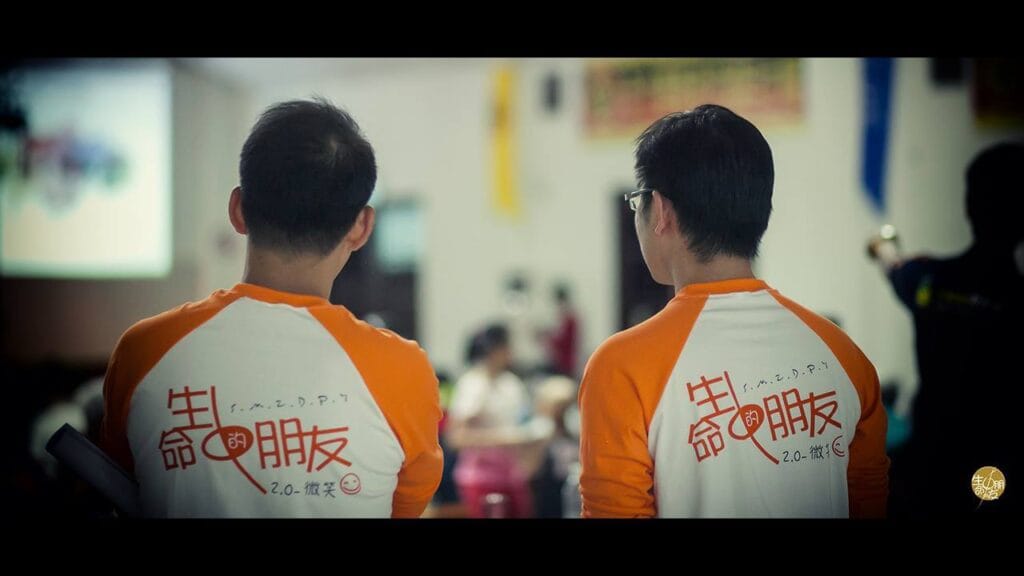
Q: Where do you usually get your inspiration to write a song such as 生命中的朋友 (the friends in your life)? The song contains very meaningful lyrics about companionship, no longer feeling lonely and having hope.
生命中的朋友 is actually the theme song for the Buddhist youth group. I think it was around the year 2004, I joined the Buddhist youth group and become the one of the committee members. This song was actually written by Reverend. After which, I composed the melodies. We used this song in the Buddhist camp. I remember it was the third day of the camp. I went home early in the morning to bring something, and when I returned to the camp, I saw the youths have fallen asleep. They were tired from the two days of activities and laying there. Some haven’t yet changed into their pyjamas. Somehow that moment became very touching to me. I felt that I can instil an important moment into them. Some of them are still in Buddhist circle and are contributing. Hence, this song (生命中的朋友) is for them.
There are a few other songs that there are in the album such as one song called 生气时停一停. It means that when you’re angry, stop. I wrote that because I quarrelled with my wife the other day and I told myself that I should stop. However, this song turned out to be useful for the for the Buddhist youth group as well. During their normal activities, I would share this song with them, share some message about anger management.
There is another song I wrote called 转变 (change). It’s about 无常, which means impermanence. Eventually, we turned them into an album and share them with a lot more people.
I think the important thing is that I am not numbed by the so called ‘adult-world’. I continue to have a lot of small moments that inspire me, that touch me. From there, I can start creating and I can continue to have all these inspirations to write songs.
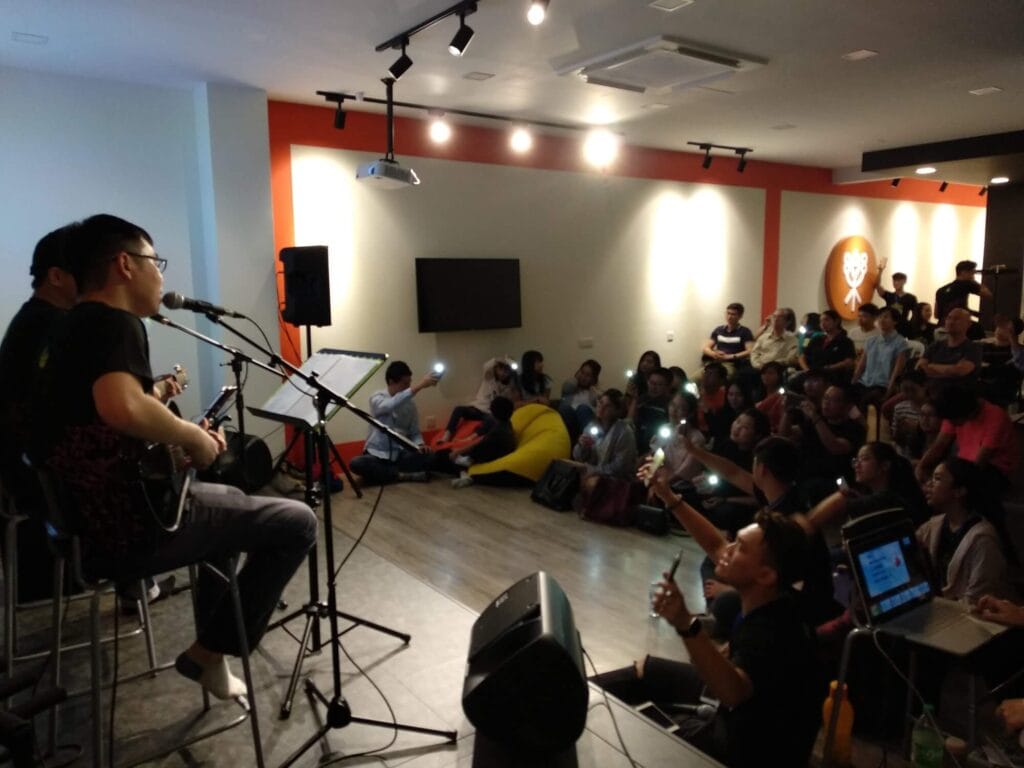
Q: Share with us more about the power of songs and how it can impact lives.
I think that the lyrics can sometimes touch people deeply. For example, the album that I produced recently, the lyrics are all written by the youths. But they can write something such as 把佛教扛在我们的肩上 (Carry the Buddhist teachings on our shoulders). They are just secondary school students about 15 or 16 years old, but they could write lyrics (as profound) like that. Sometimes this inspires me a lot. There are a lot of good lyrics such as: I travel around the world, I see all the world, but the things that I worry the most is, I have the feeling of missing home.
Actually, this song that was written by that young friend who just passed away. During the production, we have some electric guitars, very rock electric guitars running at the background to show that feeling of missing home. When I heard this news (about his passing), we were around the final production and the mixing stage. Typically people would lower the volume of the guitar so that the vocals can appear more clearly to people. However, during the final production, I purposely didn’t want to lower volume of the guitars in order to communicate the message that we are living in a very harsh world. I was hoping that people can understand that.
Music is a very powerful tools for young people. Because you remember when we are young, when we were in secondary school, we always remember there’s one song that would bring back the memories. But when we become adults, music becomes something that we use to cool ourselves down (play at the background), that we can play on Spotify. They become less meaningful to us. This might be because we have a lot more things to consider. Our adrenaline at this moment in time is less as compared to our younger days and our emotions may not be as easily aroused by music. But those were beautiful moments. When we were young, we are easily aroused and very easily touched by people. I think those are very important moments for us to develop our character.
Q: When we walk the path of the Dhamma, we are after peace. And music seems to be against peace because with the instruments and melodies we get hyped up and have our emotions stirred up. How do you reconcile the spiritual practice with music?
When it comes to learning the Dharma, I do agree that music can make you more emotional, and make you less at peace sometimes. Hence, if I want to learn the Dharma, probably, one day I should give up music.
However, I think music can be used for different purposes. For example, the music that I mostly create for the youths is with the purpose of attracting them to join the circle and to join the community to make friends. From the community, they can get to know a reverend. And eventually when they meet with troubles, they would have a lot of good friends and teachers to help them. So on that part, there is less limitation in the kind of music I can produce. I could do a pop song or even hip hop. But, of course the content needs to be appropriate for these type of genres.
Actually, I can give up music now if I want to. But I continue to find that music is meaningful tool that I can use to inspire more people to come into the circle. But if I am already in the circle, and if I want to learn the Dharma, I don’t need music to that.
It is just like, when we want to eat, we need a bowl and we need fork and spoon, and so on. So, when we want to inspire some layperson to come into the circle, music can be a good tool that we can use. So I will just take it as a tool in that way. And people might say that, in that case, you become very 假 (fake), because (the songs are) not (written based on) true feelings. I do believe that at my age now, it is very difficult for me to write a suitable songs for the youths. This is because I’m at a different stage of life right now. So, for me to continue able to write songs that relate to the young ones, I would need to be in their circle and be in their youth environment. And because I have passion in it, I continue to create these kinds of environments, and I’m also trying to learn from the younger generation.
When we do composition camps with them, they have melodies that would surprise me sometimes. And from that, I learn from them as well. I think all these are means that we use to help people to get into the circles. But it’s not the ultimate target for individuals to attain Buddhahood or to learn Dharma. And that’s fine.
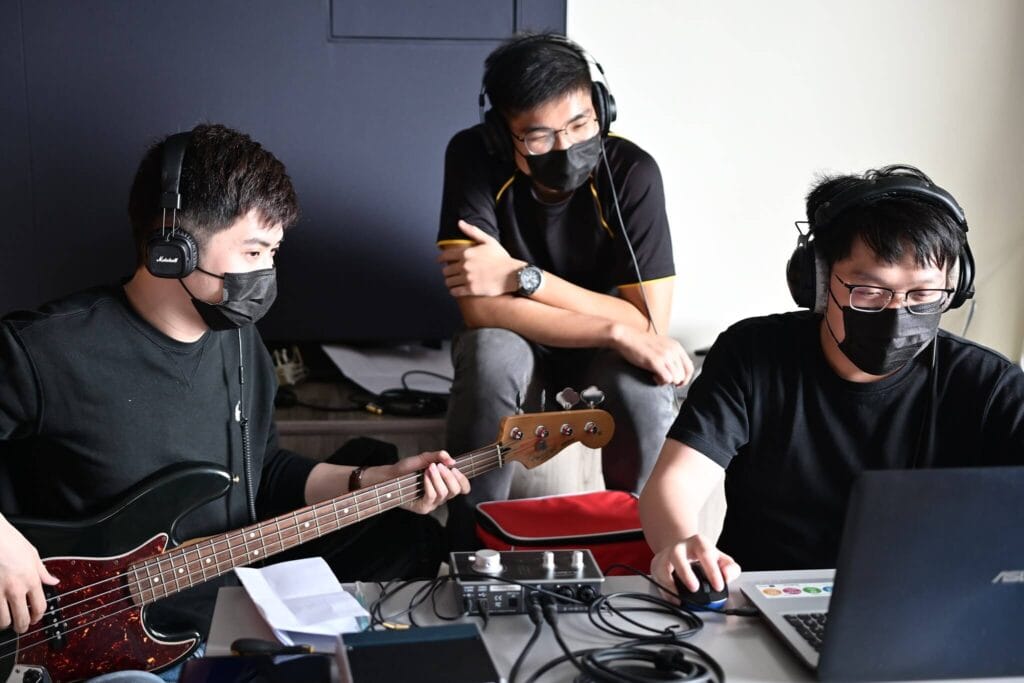
Q: What’s your aspiration for the Buddhist music scene?
There are a lot more things that we can do in the music scene. To continue to inspire more people into our circles is very important. This way, we can have a very well developed ecosystem. That is because music is also an industry which requires a lot of professions. We need talented musicians, arrangers, and on the technical side, we need to have very good audio engineers and mixing engineers and so on. All these require expertise.
I think we still need to do a lot of work to build this ecosystem now in order to have people more focused on understanding Buddhist music and how they can use, for example, audio mixing technologies to improve and achieve the objective of Buddhist music and so on. We also need to be more flexible in our content in order for the market to grow bigger and to attract more people to come in.
I do have difficulties finding some good musicians coming in to our studio and help us in Buddhist music production due to religious matters. I hope that in future we can have more talented people join us, and that we can have different varieties of music made available. For example, some music can calm you down, there’s music that can inspire you to learn the Dharma, but there should also be some music that can attract the youths, some music that is interesting for children, some that can be sung along during activities with everyone clapping, dancing and shouting together. These are the kinds of music we can create.
Q: How can one start contributing to the scene?
Get a degree in music. (joking) They can call me. We are continuing our efforts in conducting composition camps. We also work with organisations like Singapore Buddhist Mission (SBM) for concerts and so on. These are activities that we can do to help organisations to inspire the younger generations to like music and continue their effort in this.
That’s why, if this possible, I hope that a lot of organisations can come to realise the importance of this area and continue to put in some effort and energy to create these kinds of activities to inspire the younger generation. There can also be some kind of Buddhist music awards, so that we can continue to inspire people to come into the circle and allow this to become their profession.
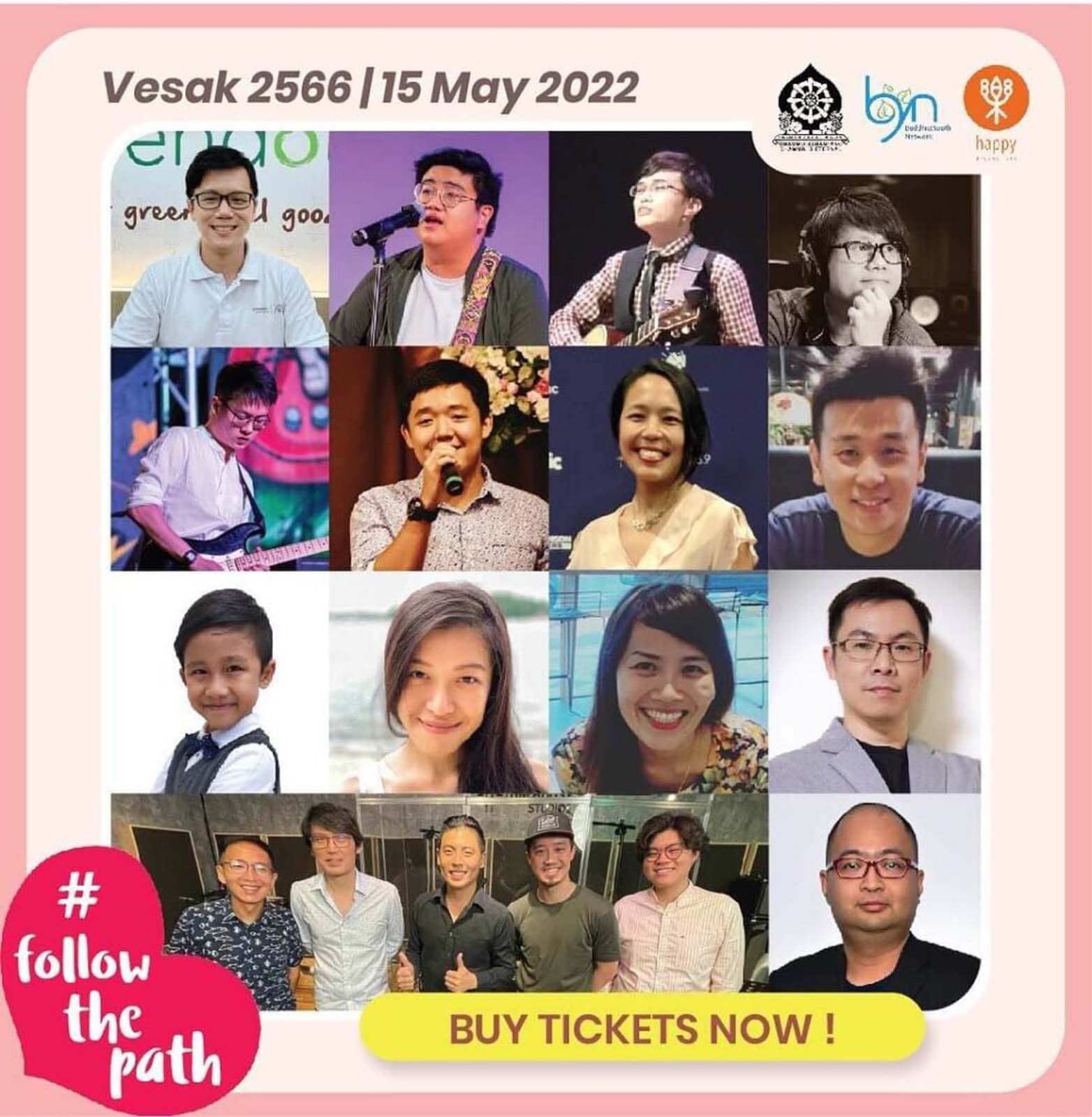
Q: How can one can get in touch with you and join any upcoming composition camps?
- My personal facebook account as I share various information:
- 生命中的朋友: We use this platform to focus on music to propagate Dharma.
- Facebook: https://www.facebook.com/smzdpy
- Instagram: https://www.instagram.com/smzdpy/
- Happy Studio: As a company, we do a lot of different kinds of music and genre as well (including non-Buddhist music). They are circular music such as commercial jingles, and charity music as well.
- Facebook: https://www.facebook.com/happyprostudio
- Instagram: https://www.instagram.com/HappyProStudio/
- Le (乐) music. Le Music is an App created to feature more secular music that can bring positive vibes to the communities
- Facebook: https://www.facebook.com/LeMusicStoreSg
- Instagram: https://www.instagram.com/lemusicstore/
We did sign up some artists and they produced their EP and singles. Those are almost like pop music. But it reflects the what people think of the current trend. For example, there are songs about working from nine to five that kind of feeling and still able to chase their dreams. These are the kinds of messages that we continue to share.
Le Music is also a good platform for us to continue to use music as a tool to help people, hopefully. Because now we are in a very fast paced society. And we don’t have time to stop and think about what is happening around us and what we should do next. So I hope that love music can be a platform for people to listen to some music and hopefully triggers or remind them that they can do something different thing in a very fast paced world, they can still refresh and do something that is meaningful for themselves.

